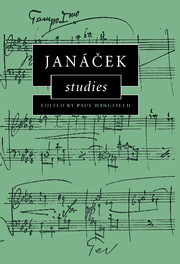Book contents
- Frontmatter
- Contents
- Preface
- 1 Expressive sources and resources in Janáček's musical language
- 2 ‘Nothing but pranks and puns’: Janáček's solo piano music
- 3 Narrative in Janáček's symphonic poems
- 4 Evasive realism: narrative construction in Dostoyevsky's and Janáček's From the House of the Dead
- 5 Direct discourse and speech melody in Janáček's operas
- 6 Kundera's eternal present and Janáček's ancient Gypsy
- 7 Janáček's folk settings and the Vixen
- 8 Janáček's operas in Australia and New Zealand: a performance history
- 9 Janáček's Moravian publishers
- 10 Janáček, musical analysis, and Debussy's ‘Jeux de vagues’
- Index
10 - Janáček, musical analysis, and Debussy's ‘Jeux de vagues’
Published online by Cambridge University Press: 22 September 2009
- Frontmatter
- Contents
- Preface
- 1 Expressive sources and resources in Janáček's musical language
- 2 ‘Nothing but pranks and puns’: Janáček's solo piano music
- 3 Narrative in Janáček's symphonic poems
- 4 Evasive realism: narrative construction in Dostoyevsky's and Janáček's From the House of the Dead
- 5 Direct discourse and speech melody in Janáček's operas
- 6 Kundera's eternal present and Janáček's ancient Gypsy
- 7 Janáček's folk settings and the Vixen
- 8 Janáček's operas in Australia and New Zealand: a performance history
- 9 Janáček's Moravian publishers
- 10 Janáček, musical analysis, and Debussy's ‘Jeux de vagues’
- Index
Summary
Úvodní slovo
during the past year I have got to work and read all the harmony manuals, beginning with Reicha-Paris up to Schoenberg. I believe that my path is the right one.
(Janáček, 1920)Most would agree with Michael Beckerman's statement that to Janáček ‘theory was both as important as composition and vitally related to composition’. There is, however, still widespread confusion about the content of Janáček's ‘theoretical’ writings, few of which have been translated. Also, the composer's importance within the field of discourse about music is all too often accorded only superficial debate. Commentators are apt summarily to consign Janáček to the periphery, asserting that he is excessively ‘metaphysical’ and ‘incoherent’. Jaroslav Vogel, for example, finds Janáček's ‘written deductions unmethodical and hard to understand’; and John Tyrrell observes in a blunt one-liner: ‘Janáček's theoretical writings had no impact on Czech theoretical thought.’ Even those writers more positive about Janáček's theoretical activities tend to eschew reasoned argument. Jaroslav Volek crudely divides all musical theorists into two camps, the ‘mechanico-materialists’ (e.g. Helmholtz) and the ‘idealists’ (e.g. Hauptmann), and claims that Janáček's achievement lies in his ‘middle’ stance. Perhaps surprisingly, then, I would like to suggest that Janáček made a ‘mainstream’ contribution to the field of ‘music theory and analysis’. Before pursuing this with reference to the composer's unpublished 1921 analysis of Debussy's La mer (1903–5), I shall briefly appraise the literature.
- Type
- Chapter
- Information
- Janácek Studies , pp. 183 - 280Publisher: Cambridge University PressPrint publication year: 1999



